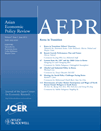
Asian Economic Policy Review
Scope & Guideline
Shaping the future of economic discourse in Asia.
Introduction
Aims and Scopes
- Economic Policy Analysis:
The journal focuses on critical assessments of economic policies in various Asian countries, examining their effectiveness, challenges, and impacts on growth and development. - Regional Economic Integration:
There is a significant emphasis on studies related to regional integration, particularly within ASEAN and South Asia, exploring the economic, political, and social implications of integration efforts. - Macroeconomic Stability and Reforms:
Research addressing macroeconomic stability, including fiscal and monetary policies, structural reforms, and their effects on national economies is a core area of focus. - Trade and Globalization Issues:
The journal explores the impacts of trade policies, globalization, and deglobalization trends on Asian economies, emphasizing supply chain dynamics and international trade relations. - Socio-Economic Inequality and Welfare Policies:
There is a consistent focus on socio-economic inequalities, welfare policies, and their implications for social justice and economic inclusion across Asian societies. - Digital Economy and Financial Inclusion:
The journal investigates the role of digital finance and fintech innovations in enhancing financial inclusion and economic participation in emerging markets. - Environmental Economics and Sustainable Development:
Research on environmental economic policies, energy transitions, and sustainable development practices in Asia is also a significant aspect of the journal's scope.
Trending and Emerging
- Impact of Digital Transformation:
There is a growing emphasis on the implications of digital transformation, particularly in finance and trade, highlighting the role of technology in shaping economic policies and practices. - Geopolitical Economic Dynamics:
Research exploring the intersection of geopolitics and economics is increasingly prominent, particularly in the context of supply chain decoupling and international relations. - Sustainability and Green Economics:
Emerging themes around sustainability, green finance, and environmental policies are becoming more prevalent, reflecting global priorities towards climate change and sustainable development. - Economic Responses to Global Crises:
The journal is increasingly addressing how Asian economies respond to global crises, such as the COVID-19 pandemic, with a focus on resilience and recovery strategies. - Social Justice and Inclusive Growth:
There is a rising trend in examining socio-economic inequalities and the effectiveness of welfare policies aimed at promoting social justice and inclusive economic growth.
Declining or Waning
- Historical Economic Analyses:
There appears to be a waning interest in historical economic analyses of Asian economies, which were previously more prevalent in earlier publications. - Labor Market Dynamics:
Discussions specifically centered on labor market dynamics and their implications for economic policy have diminished, with fewer studies dedicated to this critical area. - Trade Policy Mechanisms:
Research focusing on specific trade policy mechanisms and their technical aspects has seen a decline, as the journal shifts towards broader economic themes. - Crisis Management Strategies:
The focus on crisis management strategies related to past economic crises (e.g., financial crises) has decreased, reflecting a shift towards current economic challenges. - Industry-Specific Economic Studies:
There has been a noticeable reduction in industry-specific studies, which were once a staple of the journal's offerings, favoring more generalized economic themes.
Similar Journals
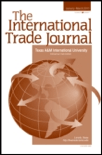
International Trade Journal
Fostering understanding in the world of trade.The International Trade Journal, published by Taylor & Francis Ltd, is a vital resource in the field of international trade, economics, and business management. Established in 1986, this journal offers a platform for rigorous empirical and theoretical research, focusing on the dynamics of global trade and its implications on economic and international policy. With an ISSN of 0885-3908 and an E-ISSN of 1521-0545, it serves as a valuable reference for scholars and practitioners alike. The journal is ranked in the Q3 category for Economics, Econometrics and Finance, signifying its role in disseminating high-quality research. Although it currently does not offer Open Access, the journal's wealth of insights supports researchers and professionals in navigating the complexities of international trade while shaping informed policies. With convergence from 1986 to 2024, the International Trade Journal continues to be an essential tool for fostering knowledge and understanding within this increasingly interconnected global economy.

CESifo Economic Studies
Bridging Theory and Empirical Findings in EconomicsCESifo Economic Studies, published by Oxford University Press, is a distinguished academic journal that focuses on the interdisciplinary exploration of economics and its implications on society. With an ISSN of 1610-241X and an E-ISSN of 1612-7501, the journal aims to disseminate high-quality research that contributes to the advancement of economic knowledge, particularly emphasizing empirical findings and innovative theoretical frameworks. As a recognized leader in its field, CESifo Economic Studies holds a 2023 Q2 ranking in both Economics and Econometrics and Geography, Planning and Development, reflecting its significant impact and relevance in these areas. The journal is accessible through traditional subscription models, ensuring that critical economic research remains available to scholars, policymakers, and educators alike. With a commitment to excellence in publication, the journal supports the academic community through the provision of rigorous peer-reviewed articles that address current challenges and trends in economics. Researchers and students seeking to deepen their understanding of economic mechanisms will find this journal an invaluable resource.
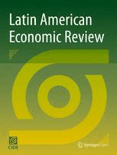
Latin American Economic Review
Catalyzing Collaboration in Latin American EconomicsLatin American Economic Review, published by CENTRO INVESTIGACION & DOCENCIA ECONOMICAS-CIDE, is a pioneering open-access journal that has been contributing to the field of economics since its establishment in 2014. With a focus on the diverse economic landscapes of Latin America, it aims to foster a rich dialogue among researchers, policymakers, and practitioners about pressing economic issues and innovative solutions. The journal, which holds an ISSN of 2198-3526 and an E-ISSN of 2196-436X, provides an accessible platform for the dissemination of high-quality research, reflecting a commitment to advancing knowledge in the realms of economics, econometrics, and finance. Though currently positioned in the Q4 category in Economics within Scopus rankings, it continues to evolve, providing valuable insights and fostering collaboration across various disciplines. The journal's open access model enhances its reach, allowing unrestricted availability of content to researchers and practitioners worldwide. As the journal converges through its second decade (2014-2024), it remains dedicated to promoting critical analysis and discussion on economic challenges and policies that affect the region and beyond.
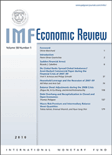
IMF Economic Review
Exploring Innovative Analyses in Economics and BusinessIMF Economic Review, published by Palgrave Macmillan Ltd, stands as a preeminent journal in the fields of Economics and Business Management, holding a prestigious Q1 ranking in both categories as of 2023. With an ISSN of 2041-4161 and an E-ISSN of 2041-417X, this journal not only showcases high-quality, peer-reviewed research but also embraces the principles of Open Access, promoting wide dissemination of its findings to researchers, professionals, and students alike. Spanning significant years from 2010 to 2024, the IMF Economic Review features innovative analyses and insights that challenge conventional economic paradigms and foster deeper understanding of global economic dynamics. Its impressive Scopus ranking places it in the top 10% of economics journals globally, affirming its vital role in advancing academic discourse and practical application in economics and finance. For those dedicated to exploring the intricacies of economic theory and practice, the IMF Economic Review is an invaluable resource that not only informs but also inspires.
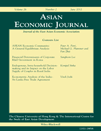
Asian Economic Journal
Advancing Knowledge on Development StrategiesAsian Economic Journal, published by WILEY, represents a crucial platform for scholars and practitioners in the fields of economics, development, and geography. Since its inception in 1987, this journal has evolved to encompass a wide array of research that addresses pressing economic challenges and innovative methodologies relevant to the Asian context and beyond. With an active publication timeline extending to 2024, the journal is indexed under various quartiles classifications, notably achieving a Q3 status in prominent categories such as Development and Economics. Researchers can access its rich repository of articles to deepen their understanding of economic dynamics, regional planning, and development strategies. Although the journal is not open access, its contributions are indispensable for those seeking to enrich the discourse on economic policies and development trends in Asia, making it an essential read for professionals, researchers, and students alike.
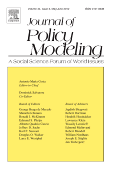
JOURNAL OF POLICY MODELING
Shaping Future Policies with Rigorous Economic ModelingJOURNAL OF POLICY MODELING, published by Elsevier Science Inc, is a leading forum for theoretical and applied research in the fields of policy analysis and economic modeling. With an impressive impact factor and classified in the Q1 category of Economics and Econometrics, this journal ranks in the top 82nd percentile among peers in its field, reflecting its significant contributions to academic discourse and practical policy applications. Established in 1979, it offers a robust collection of research spanning through 2024, making it a vital resource for scholars, policymakers, and practitioners seeking to understand complex economic and social issues. The journal aims to foster innovative modeling techniques and empirical studies that inform policy decision-making, thus playing a crucial role in advancing knowledge and facilitating informed debate in economics and related disciplines. Access options for the journal include subscription-based formats, ensuring wide availability while maintaining high-quality peer review standards.

Global Economic Review
Connecting scholars with vital economic research.Global Economic Review, published by ROUTLEDGE JOURNALS, TAYLOR & FRANCIS LTD, is a pivotal academic journal that serves the fields of Business, International Management, Economics, Econometrics, and Political Science. With an ISSN of 1226-508X and an E-ISSN of 1744-3873, this esteemed journal has been disseminating vital economic research since 1996, and is set to continue until 2024. The journal holds a notable presence in academic circles, achieving a Q3 quartile ranking in the 2023 category assessments across various disciplines, including Business and International Management, Economics, and Political Science. Notably, it ranks in the top 60th percentile for Political Science and International Relations, showcasing its significant contribution to the discourse within the social sciences. Although not an open-access publication, the Global Economic Review remains accessible to a wide range of researchers, professionals, and students, acting as a critical platform for innovative and impactful economic ideas. Its rigorous peer-review process ensures the publication of high-quality research that responds to the challenges of a rapidly evolving global economy. Scholars seeking to engage with pertinent economic issues will find this journal to be an invaluable resource.
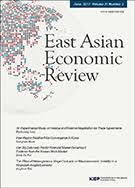
East Asian Economic Review
Navigating the Complexities of East Asian Economies.East Asian Economic Review is a premier academic journal dedicated to the multifaceted exploration of economic issues and developments in East Asia. Published by the Korea Institute for International Economic Policy, this journal serves as a vital platform for researchers, practitioners, and policymakers interested in the region's economic dynamics. Since transitioning to Open Access in 2013, it has enhanced accessibility, allowing for a broader dissemination of knowledge and fostering collaborative research. While the journal currently does not have an impact factor rating, its commitment to high-quality research continues to attract contributions that significantly advance the understanding of economic policies, trade relations, and market trends in East Asia. The East Asian Economic Review stands out as an essential resource for anyone involved in or studying the intricate economic landscape of one of the world's most dynamic regions.

International Journal of Economic Policy Studies
Exploring Innovative Solutions for Global Challenges.The International Journal of Economic Policy Studies is a premier academic journal published by SPRINGERNATURE, dedicated to advancing research in the fields of economics, political science, and sociology. With an ISSN of 2524-4892 and an E-ISSN of 1881-4387, this journal is recognized for its commitment to open access, fostering global dissemination of knowledge while promoting rigorous peer-reviewed scholarship. Based in Japan and operating from CAMPUS, 4 CRINAN ST, LONDON N1 9XW, ENGLAND, it has successfully established itself as a valuable resource for researchers and professionals alike. The journal's impact is reflected in its respectable Q3 status across major categories, including Economics and Econometrics and Political Science, complemented by its Scopus rankings that showcase its significance in the academic community. Spanning the years from 2019 to 2024, the International Journal of Economic Policy Studies serves as an essential platform for critical discussions and innovative policy analysis, making it a must-read for scholars looking to explore contemporary issues and foster informed decision-making.
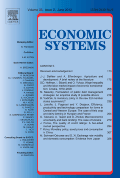
Economic Systems
Transforming understanding of economic challenges today.Economic Systems is a premier academic journal published by Elsevier, specializing in the dynamic field of economics and econometrics. With an ISSN of 0939-3625 and E-ISSN 1878-5433, this journal is known for its rigorous peer-reviewed articles that delve into economic theory, policy analysis, and empirical research, making it an invaluable resource for researchers, professionals, and students alike. Based in the Netherlands, the journal has established a strong reputation, evidenced by its Q2 ranking in Economics and Econometrics and a commendable position within the 74th percentile of its category in Scopus rankings. Covering a breadth of topics relevant to contemporary economic systems, from their structural assessments to real-world applications, Economic Systems aims to inform and advance the discourse within the field. While it operates under a subscription model, the journal ensures accessibility to groundbreaking research, encouraging a deeper understanding of the economic challenges facing today’s societies.